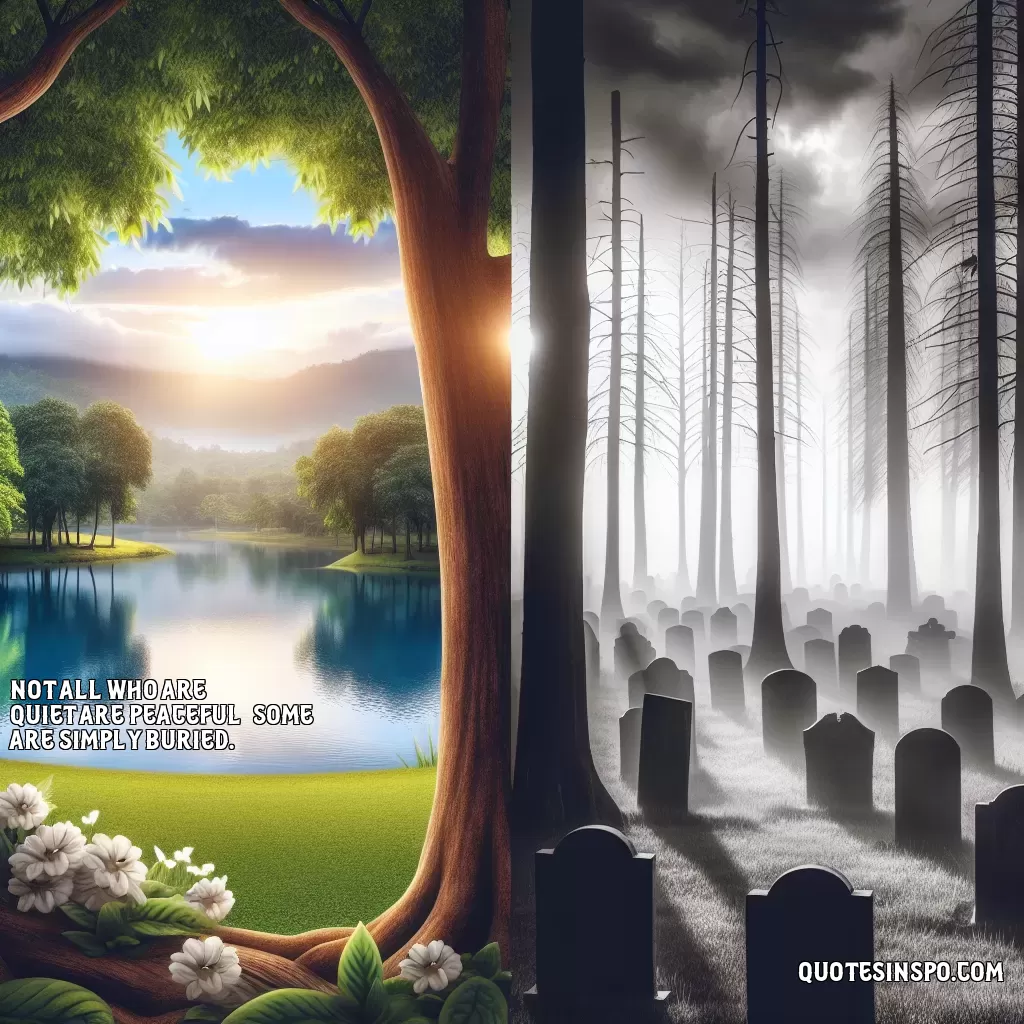
Not all who are quiet are peaceful some are simply buried.
The quote "Not all who are quiet are peaceful; some are simply buried" offers a profound insight into the human experience, suggesting that silence should not automatically be equated with serenity or contentment. Instead, it invites us to consider the myriad reasons why a person might be quiet. On the surface, quietness can indeed signify a state of peace, showcasing an individual's ability to find tranquility within themselves or their environment. Such a state might reflect mindfulness, introspection, or a deliberate choice to maintain harmony. However, the quote urges us to look deeper, acknowledging that quietness can also be a manifestation of being overwhelmed, marginalized, or ignored. The phrase "some are simply buried" is particularly evocative, implying that there are individuals who are quiet because they are figuratively buried under the weight of external pressures, personal struggles, or unresolved emotions. These individuals might be suffering silently, unable to express themselves because societal norms, fear of judgment, or even personal inhibitions stifle their voice. Therefore, this quote encourages a more nuanced understanding of silence, prompting us to be more empathetic and attentive to those around us. It suggests that beneath a calm exterior, a person might be concealing a tumultuous internal world. Recognizing this complexity, we are encouraged to engage with others compassionately, seeking to understand the stories, challenges, and strength that may reside beneath the surface of their quiet demeanor.
Quote By: Nikki Giovanni
Nikki Giovanni, born on June 7, 1943, in Knoxville, Tennessee, is a celebrated American poet, writer, and activist whose work has made a significant impact on literature and social justice. As one of the most prominent voices of the Black Arts Movement, Giovanni's poetry has resonated deeply with themes of empowerment, racial identity, and personal experience, establishing her as a powerful figure in contemporary literature.
Giovanni spent her formative years in Cincinnati, Ohio, where she was exposed to the rich cultural and artistic influences of the Civil Rights Movement. She attended Fisk University in Nashville, Tennessee, where she began to write seriously and engage in the politics of the time. Giovanni’s passion for poetry was ignited during her college years, and she quickly became known for her eloquent and powerful voice, as well as her fearless exploration of social issues.
In 1968, Giovanni published her first collection of poetry, "Black Feeling, Black Talk," which was well received and opened doors for her artistic career. Through her work, Nikki Giovanni has addressed the complexities of race, gender, and personal experience, reflecting the struggles and aspirations of the African American community. Her distinctive style blends spoken word with lyrical grace, often drawing from her own life experiences and using her platform to advocate for change.
Over the decades, Giovanni has received numerous accolades for her contributions to literature, including a National Book Award and several NAACP Image Awards. She has written over 30 books, spanning poetry, essays, and children's literature. Her works, including "Love Poems" and "Acolytes," showcase her ability to connect through language while offering profound insights into human relationships and societal issues.
In addition to her literary accomplishments, Nikki Giovanni is a professor at Virginia Tech, where she continues to inspire and mentor new generations of writers and activists. Her influence extends beyond the realm of poetry, making her a pivotal figure in the fight for social justice. Through her relentless dedication to her craft and her commitment to speaking out against oppression, Giovanni remains a vital voice in American literature, embodying the spirit of resilience and hope.